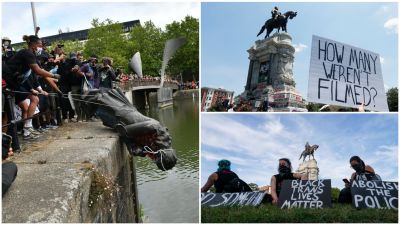Symbols and statues: The toppling of Edward Colston echoes a fierce debate in the US

The toppling of the statue of the slave trader Edward Colston on Sunday afternoon in Bristol echoes a long-running and searing debate in America about race, symbols and statues.
All across the American South, anti-racism activists have demanded the removal of the symbols of slavery and the Confederacy.
Massive protests across the US continue to demand police reform
Trump says it is a 'great day for George Floyd' as US unemployment falls
The difference in this case is that in Bristol it was protesters who toppled the statue. In America, it is the authorities themselves who are removing the symbols of an anguished past, under public pressure.
Just this week, amid the protests surrounding the death of George Floyd, the Governor of Virginia agreed to remove a towering statue of the Confederate General Robert E Lee, which currently sits in the heart of Richmond.
The Governor has now said Virginia will no longer tolerate a "false version of history."
The debate about the racist resonance of many American statues has been simmering for decades.
But it emerged into the headlines - and America’s consciousness - in August 2017 when neo-Nazis and white supremacists marched in Charlottesville, Virginia.
That march was to protest at the removal of another General Lee statue and it led to violent clashes and prompted one of the most controversial interventions of the Trump presidency, when he said that the protests saw "very fine people on both sides."
President Trump's expression of moral equivalency between anti-racism protesters and white supremacists led to widespread outrage.
The Confederate battle flag has been another particularly bitter contest between those who believe it is a celebration of slavery and racism and those who insist it speaks to their legitimate heritage as southerners.
The arguments about statues - whether it's Cecil Rhodes in Oxford or Edward Colston in Bristol or General Lee in the American South - is destined to be a continuing flashpoint.
Both Britain and America are currently looking long and hard in the mirror.
That reckoning with their troubled racial history - and how it's represented in statues and symbols - was always going to be a part of a painful trans-Atlantic debate.